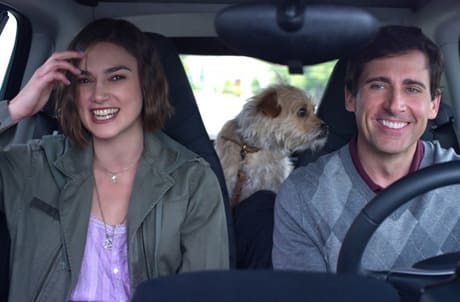To get an idea of what Seeking a Friend for the End of the World is going for, you need look no further than the casting. It's been marketed as a madcap, sad sack, Steve Carell comedy filled with cameos from the standard array of secondary comic actors like Rob Corddry and Patton Oswalt.
But in the middle of all this is Keira Knightley, whose career choices post-Pirates have leaned towards the metaphysical and tragic, often examining inherently flawed characters forced into martyrdom for their shortcomings or mistakes.
Ostensibly, this tonal blend is what first-time director Lorene Scafaria (who also penned the script) is going for: an uncompromising comedy about social breakdown in the face of mortality that doesn't ignore the complex introspection and grief associated with annihilation anxiety. She uses the old road-trip metaphor standby to sell it, throwing together the recently separated Dodge (Carell) and the erratic, self-sufficient Penny (Knightley) as companions brought together only via the process of elimination and happenstance.
Oddly enough, their initially off-putting, idiosyncratic pairing ― he is a depressive shell resigned to dying alone and she's a pot-smoking flake too guarded to establish any real human connection ― fits the trajectory of the film, which plays off the intense nature of nascent relationship development. This is a movie about two people learning to drop the cold, self-preservation routine and open up to each other, warts and all.
What's problematic is the wild vacillation in tone, which goes from screwball antics, with Carell, Knightley and Adam Brody having a discussion about relationships in the middle of a riot, to reflective and tragic ― these are people dealing with impending death, after all ― within a heartbeat. It's thematically appropriate, given the intense, manic nature of the subject matter, but could easily divide or alienate audiences looking for one type of film or the other. Scafaria's shot composition is also an issue, as is the editing, with lingering close-ups lasting too long and scenes intended to be funny missing their mark when visual gags (see Melanie Lynskey) are repeated clumsily.
But for all of these flaws, there are hilarious sequences of the adjacent social order, where friends are finally honest with each other ― "I'm surprised your wife didn't leave you sooner; she always seemed so miserable with you" ― and people openly trying heroin because, "hey, why not?" Similarly, the actual exploration of human connections is quite intense, touching on the nature of love as a selfless act rather than one that's self-serving.
While easily criticized for wearing its heart on its sleeve and making some freshman mistakes in execution, there's something deeply moving about a movie that actually contemplates the nature of what it means to be alive without losing its sense of humour. It's just unfortunate that it's being marketed towards an audience that has no interest in such a subject.
(eOne)But in the middle of all this is Keira Knightley, whose career choices post-Pirates have leaned towards the metaphysical and tragic, often examining inherently flawed characters forced into martyrdom for their shortcomings or mistakes.
Ostensibly, this tonal blend is what first-time director Lorene Scafaria (who also penned the script) is going for: an uncompromising comedy about social breakdown in the face of mortality that doesn't ignore the complex introspection and grief associated with annihilation anxiety. She uses the old road-trip metaphor standby to sell it, throwing together the recently separated Dodge (Carell) and the erratic, self-sufficient Penny (Knightley) as companions brought together only via the process of elimination and happenstance.
Oddly enough, their initially off-putting, idiosyncratic pairing ― he is a depressive shell resigned to dying alone and she's a pot-smoking flake too guarded to establish any real human connection ― fits the trajectory of the film, which plays off the intense nature of nascent relationship development. This is a movie about two people learning to drop the cold, self-preservation routine and open up to each other, warts and all.
What's problematic is the wild vacillation in tone, which goes from screwball antics, with Carell, Knightley and Adam Brody having a discussion about relationships in the middle of a riot, to reflective and tragic ― these are people dealing with impending death, after all ― within a heartbeat. It's thematically appropriate, given the intense, manic nature of the subject matter, but could easily divide or alienate audiences looking for one type of film or the other. Scafaria's shot composition is also an issue, as is the editing, with lingering close-ups lasting too long and scenes intended to be funny missing their mark when visual gags (see Melanie Lynskey) are repeated clumsily.
But for all of these flaws, there are hilarious sequences of the adjacent social order, where friends are finally honest with each other ― "I'm surprised your wife didn't leave you sooner; she always seemed so miserable with you" ― and people openly trying heroin because, "hey, why not?" Similarly, the actual exploration of human connections is quite intense, touching on the nature of love as a selfless act rather than one that's self-serving.
While easily criticized for wearing its heart on its sleeve and making some freshman mistakes in execution, there's something deeply moving about a movie that actually contemplates the nature of what it means to be alive without losing its sense of humour. It's just unfortunate that it's being marketed towards an audience that has no interest in such a subject.
